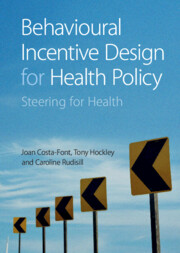
- Publisher:
- Cambridge University Press
- Online publication date:
- May 2023
- Print publication year:
- 2023
- Online ISBN:
- 9781009168113
Our systems are now restored following recent technical disruption, and we’re working hard to catch up on publishing. We apologise for the inconvenience caused. Find out more: https://www.cambridge.org/universitypress/about-us/news-and-blogs/cambridge-university-press-publishing-update-following-technical-disruption

Behavioural economics has become a popular way of tackling a broad range of issues in public policy. By presenting a more descriptive and possibly accurate representation of human behaviour than traditional economics, Behavioural Incentive Design for Health Policy tries to make sense of decisions that follow a wider conception of welfare, influenced by social norms and narratives, pro-social motivations and choice architectures which were generally neglected by standard economics. The authors show how this model can be applied to tackle a wide range of issues in public health, including smoking, the obesity crisis, exercise uptake, alcoholism, preventive screenings and attitudes towards vaccinations. It shows not only how behavioural economics allows us to better understand such challenges, but also how it can design effective incentives for addressing them. This book is an extensive reassessment of the interaction between behavioural incentives and health.
‘Costa-Font, Hockley and Rudisill have produced a thoughtful and comprehensive guide to the application of behavioral economics to issues in health, health care and health policy. It offers an essential platform to those seeking to engage in understanding the complicated forces shaping economic behavior in the health sector.’
Richard Frank - Senior Fellow, The Brookings Institution
‘Steering Health provides an unusually comprehensive, yet highly readable, review and analysis of the burgeoning field of behavioral health economics. Covering a wide variety of topics, including prevention, aging, and physician decision-making, it offers the reader a clear understanding of when behavioral vs. traditional economic incentives are most effective. With an eye to public programs, it is essential reading not only in the classroom and field, but also to those who influence or formulate health policies.’
Thomas Rice - Distinguished Professor, UCLA Fielding School of Public Health
‘Medicine is complicated, filled with uncertainty, and with stakes that are as high as they get. A perfect storm for psychological biases to creep into every decision that patients and doctors make. And also a perfect opportunity for a fascinating book to show us how behavioral economics can uncover these biases and make health care, and health, better.’
Anupam B. Jena - Economist and physician at Harvard University, author Random Acts of Medicine
 Loading metrics...
Loading metrics...
* Views captured on Cambridge Core between #date#. This data will be updated every 24 hours.
Usage data cannot currently be displayed.